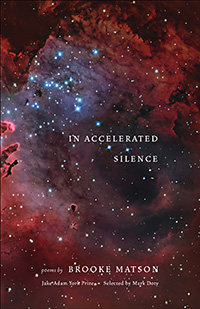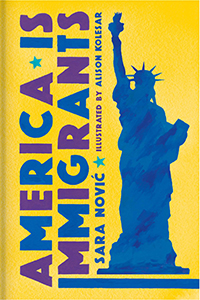 print preview
print previewback BLACKBIRD EDITORS
Recommendations & Reviews
This spring, the Blackbird Editors present reviews and recommendations of books that have
been particularly enticing lately, from Gwen E. Kirby’s enticing debut story collection Shit
Cassandra Saw, to Brooke Matson’s remarkable second book of poetry In Accelerated Silence,
to Sara Nović’s brightly illustrated collection of short biographies America is Immigrants.
Shit Cassandra Saw by Gwen E. Kirby | Review by James Fowler
Penguin Books, 2022
 |
Radioactive cockroaches, a taxidermy dog, a Yelp review, and a softball game shortly after a school shooting provide just some of the many vehicles for nuanced approaches to feminism and storytelling in Gwen E. Kirby’s debut short story collection, Shit Cassandra Saw. Kirby not only draws on new forms of fiction, but also relies on famous historical and mythological figures like Cassandra of Troy, Boudicca Queen of the Britains, and the first woman ever hanged for witchcraft to invoke the benefit of a 2022 hindsight. These stories—those featuring historical as well as those of created characters—sing one layered chorus of anger, frustration (sexual and otherwise), lust, desire, apathy, and rage in a fabulously explosive collection.
Let us take Cassandra of Troy—endowed with the gift of prophecy by Apollo and remarkable for then refusing his sexual advances. Kirby gives her the benefit of knowing that while she is able to form opinions on the newness of future things—kooky T-shirts, Bud Light, and even NAFTA—the future holds things familiar to her own space and time: “Cassandra has not noticed a lack of men telling women what to do.” Thankfully, through Kirby’s humorous prose, Cassandra also has the reassurance that the Trojans, who don’t listen to her prophecies, will mainly be associated with a brand of condoms in a future context—giving poignant meaning to the latter part of the story’s title, “Because at That Point Fuck Them Anyway.”
Throughout the collection we get the sense from Kirby that women in history and those represented in her stories have scraped, clawed, and fought to remain front and center in their individual narratives—and have done so to escape being sidelined by the more masculine, heroic, overly inflated male presence.
Much of what enables these stories to land effectively is the refreshing way Kirby approaches the craft of fiction and how she embraces unusual found forms and makes them into literature. In “Jerry’s Crab Shack: One Star,” a husband leaves a one-star Yelp review for a subpar seafood restaurant and appropriates its space to vent about his marriage. “A Few Normal Things That Happen a Lot” explores scientific breakthroughs, or accidents, which give women sharp fangs or cockroach antennae to ward off men asking them to smile—or who masturbate next to them on the subway in an outrageous blend of science fiction and comedy.
While Kirby is a virtuoso of comedic timing in her stories, she also provides a great deal of genuine human compassion that is just as effective and more apparent than her use of comedy. In “Casper,” through the structured hierarchy of friendships and relationships, Kirby invites her readers to care just as much about a taxidermy dog as we would about a live one. Similarly, Kirby offers a great deal more than the exhausted “thoughts and prayers” response to school shootings in the story “Mt. Adams at Mar Vista.” Kirby uses a careful hand to explore the complicated motivations of a team unified by a tragedy and yet pushing to win and maintain a sense of competition even while she simultaneously depicts the opposing team in its struggles with a wavering mix of sympathy and determination.
Shit Cassandra Saw is a master class of genre-twisted short stories that push back against the claustrophobic misogyny and violence in a patriarchal power structure. All at once Kirby invites us in to laugh, to cry, to scream, to be aroused, and to be amazed.
Gwen E. Kirby is the author of Shit Cassandra Saw (Penguin Books, 2022). Her work appears or is forthcoming in One Story, Tin House, Guernica, Mississippi Review, Ninth Letter, Blackbird, SmokeLong Quarterly, and elsewhere. Currently, she is the associate director of programs and finance for the Sewanee Writers’ Conference at the University of the South, where she also teaches creative writing.
~
In Accelerated Silence by Brooke Matson | Review by Rebecca Poynor
Milkweed Editions, 2020
 |
Brooke Matson’s debut poetry collection, In Accelerated Silence, examines grief and loss through the language of physics, chemistry, biology, and astrophysics and employs a blend of the scientific and the lyric to do so. Matson’s poems ache with a desire for knowledge and the desperate need to understand one’s own tragedy and, by extension, the universe that brought it. The poet juxtaposes the elegiac and odic modes of lyric, and these poetic sensibilities operate as counterpoints to one another, traversing an emotional arc that confronts the speaker’s experience of grief and also investigates a hopeful longing to praise the life and world that remain following personal tragedy.
The scientific language of Matson’s poems often strikes against these formal modes of elegy and ode, but Matson skillfully blends these, sometimes, competing tones. In the poem that begins the book, “Ode to Dark Matter,” Matson writes, “They think // you’re already theirs: / a variable to ensnare in a net sum, // the way children trust / answers to soothe.” This tension existing between modes combines with the scientific subject matter to grab a reader and propel that reader through the emotional arc of the individual poems into the collection as a whole, grounding both speaker and reader in the scientific physicality of the world.
Early in the book, in the poem “Red Giant,” Matson connects the astrophysical to biomedical, and both of these scientific fields connect to the emotional crux of the book: the speaker’s own loss, and the narrative of events that led to it. “Red Giant” introduces a diagnosis for the speaker’s partner. Matson writes “I tasted metal // you mused after, as if it were an experiment / not a hunt for cells intent // on your death.” The speaker and the subject of the poem seek answers in the past tense, “We didn’t know // the isotope that laced your veins / was stripped from fuel rods, // old nuclear reactors— / a chemical back-burn to fight the fire // igniting your scan.” Throughout the collection, the speaker often reckons with the divide between the desire for knowledge and the understanding that this knowledge does not always bring satisfactory answers.
Often, the scientific language of Matson’s works connects the feeling of hope to something scientifically definable for the speaker. In “There is a Room in the Four Dimensions of the Space-Time Continuum” Matson writes of an imagined world where speaker and subject are given space to still exist together. Matson writes, “There is a kitchen embedded / in the fibers of time // where your chest trembles / under my hands . . .” Through the scientific concept of the space-time continuum, the speaker searches for a hopeful world wherein the speaker’s partner is still alive. Matson allows for the speaker some refreshing selfishness. The speaker hopes for a world where the subject is alive, but she also settles into the imaginary as a means of comfort.
Matson thus melds the scientific and emotional together in a way that is rarely accomplished with such poetic elegance. After poems spent often within both emotional darkness and the darkness of space, the book ends with the speaker celebrating the emergence of a certain luminosity. In direct conversation with “Ode to Dark Matter,” the final poem, “Ode to the Sun,” leaves the reader with brightness, pulling forth the strands of hope spread across the book. Matson writes, “I want to be // blinded so when I close / my eyes even then // you are with me— / thumbprint // on the darkness—” The speaker feels rather than sees the sun in her own darkness. And this final sentence of the book is never formally concluded—finishing with an em dash rather than a period as Matson withholds the typical note of finality from this collection. The reader is left with not just light and hope, but the prevailing memory of it, and the sense that everything remains unfinished.
Brooke Matson is the author of In Accelerated Silence (Milkweed Editions, 2020), selected by Mark Doty as winner of the 2019 Jake Adam York Prize, and The Moons (Blue Begonia Press, 2012). Her poems have appeared in Potomac Review, Prairie Schooner, TAYO, Willow Springs, and elsewhere. She is the founding executive director of Spark Central.
~
America Is Immigrants by Sara Nović | Review by Jamie Walters
Random House, 2019
 |
In America is Immigrants, a nonfiction collection, Sara Nović navigates the messiness of American identity. With over two hundred short biographies and bright illustrations by Alison Kolesar, this project celebrates the work of Americans who hail from nearly every country in the world, while challenging the ideas of border restrictions and nationality. Even origin becomes a fuzzy concept, as these capsule biographies attest. NASCAR driver Mario Andretti migrated from Istria, Italy—a place that has since become Croatia. Marcus Samuelsson, a world-renowned chef, left Ethiopia via Sweden, and now specializes in Harlem soul food. “What started out feeling like a much tidier project than a novel,” Nović writes, “soon collapsed into a complicated exploration of identity.”
If this work exposes the nebulous limits of country, it also conveys the limitlessness of human achievement. Lhakpa Sherpa, the first Nepali woman to successfully summit Mt. Everest, did so while pregnant. Elie Wiesel, an Auschwitz survivor, wrote more than fifty books and won the Nobel Peace Prize. One entry, titled “Great Innovators,” catalogs inventions that range from the yellow fever vaccine to waffle cones. Throughout, Nović exhibits an artist’s love of other artists, with sections devoted to creators, builders, and pioneers.
Beneath the light tone plays a throughline of displacement and national rupture. Iman, a supermodel, came to America as a wartime refugee from her native Somalia, as did Meb Keflezighi, an Olympic runner who fled violence in Eritrea. Miriam Makeba was exiled from South Africa for over three decades “due to her anti-apartheid activism.” Before Ishmael Beah published the acclaimed memoir A Long Way Gone, he was a child soldier in Sierra Leone, where he “killed more people than he could count.”
Nović’s work is too comprehensive for any partisan agenda, but it was compiled, in part, as a response to the Trump administration and its immigration policies. “While a political battle over a border wall raged around me,” writes Nović, “I amassed living proof of the artificiality, injustice, and utter subjectivity of borders all across the world.” America is Immigrants reveals how profoundly immigrants have shaped American culture and delivers a timely reminder to look beyond our own walls.
Sara Nović is the author of the nonfiction collection America Is Immigrants (Random House, 2019) and the novel Girl at War (Random House, 2015). Her novel, True Biz, is forthcoming from Random House in 2022. She is an instructor of Deaf studies and creative writing. ![]()